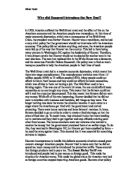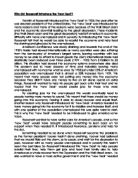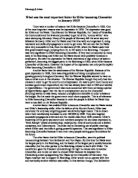Why did the League of Nations fail in the 1930s?
Why did the League of Nations fail in the 1930s? Technically, the League of Nations was still active until the end of the Second World War. However, by 1935 it was clear it could no longer perform its main role - that of keeping peace. Mostly, and ironically, it seems the failures of the League came from the countries that were involved in the League. " it was not the League which failed. It was not its principles which were found wanting. It was the nations which neglected it. It was the Governments which abandoned it." There was no sense of an International community as Wilson had seen in his vision when he created the League. Nor was there a sense of the countries involved being willing to put themselves into a position to protect one another. Most were either in the League to protect themselves or to aid them in returning to their financial and economical positions they were in before the war. A perfect example of this was Britain and France. The League of Nations depended largely on the support of Britain and France, but these countries were too nationalistic. They were not prepared to abandon their own interests to sustain the principle of collective responsibility. Britain wanted to restore her wealth and power via trade lost throughout the war. France was also pre occupied with her own state of affairs during the post war period and wanted to prevent a third German
Why did the Munich putsch fail?
By the one and only Caleb Barnes-Christian Munich Putsch Coursework 2. Why did the Munich putsch fail? The Munich Putsch failed in 1932 for many reasons but all together the poor planning was to blame because if the planning was perfect many of the things I will list wouldn't have happened. The Munich Putsch failed for these main reasons * Hitler and Ludendorff thought that it would be an easy task to take it over. * Too many people knew about the attempt to take over the putsch. * When Stresemann had taken over he had helped Germany by reducing Hyper-Inflation and the economical problems that she had. * The Nazi's didn't have enough supporters. * Hitler had thought that people would just come and join in helping them take over the putsch. * Hitler and Ludendorff had assumed that they wouldn't be shot at. * Ludendorff had let von Khar and Lossow to leave the beer hall. * Hitler and Ludendorff had assumed that they wouldn't be shot at. * The police had blocked the Nazi's and started to shot at them. * It had taken too long for the whole operation to happen; the momentum of the Nazi's would have decreased a great deal. * Communications break down with Hitler and Ernest Röhm. * Hitler ran away when he was shot at. Hitler had vowed five years prior to the Putsch that he would not " rest nor sleep until the politicians who had signed the armistice had been
Why did the Munich Putsch fail?
Why did the Munich Putsch fail? The Munich Putsch failed for a number of reasons. Hitler was forced to act too quickly and to make a hasty, spontaneous response because of ill-judged and flawed plans that were based on too many assumptions. Hitler assumed that the time was right. The invasion of the Ruhr resulted in the crisis of Hyperinflation which caused disorder in Germany. Hitler believed that the people wanted a weak end to Germany and he thought that he had a lot of supporters. However, Hitler was mistaken because he had left the Putsch too late. By November 1923, the worst of Hyperinflation was over and the Germans had faith in Gustav Stresseman, as Chancellor, to solve their problems. The Putsch failed because Hitler was misguided and didn't see the wider picture. He was too focused on Bavaria and he didn't think things through. Hitler's plan was to March on Berlin, gathering support, just like Mussolini had marched on Rome in 1922. Hitler was naïve and shortsighted, he assumed too much. He thought that he could just take over Berlin and everyone would just follow him when nobody even knew whom he was. Hitler felt he had to act because he had heard that Ritter Von Kahr was threatening to make Bavaria a republic. This would ruin Hitler's plans. On the 8th November 1923, Hitler panicked. He burst into the Beer Hall because he believed
Why did Prohibition Fail?
Coursework Assignment- Why did Prohibition Fail? The act of Prohibition was introduced within the American culture during the twentieth century, within the subject of alcoholic abuse and increasing establishments of saloon bars within rural and urban states. The act of Prohibition was introduced due to the strong temperance movements within the rural states present in the nineteenth century; which included Devout Christians and the Anti- Saloon League presenting their ideas and opinions on the effects of alcoholic abuse within the family environment. The members involved within the groups which created the stigma of alcohol, in the act of Prohibition, presented their case on a political view within their local state. The states were persuaded to prohibit the sale of alcohol, which lead into a wide spread National law on the purchase of alcohol. The Prohibition act came into effect on January 16th 1920, as Prohibition became a law under the Volstead act. Prohibition was set to improve the social, health and crime effects of alcohol within the country. The use of patriotic pride was used to decline the alcoholic abuse present within the country; as many German breweries were exporting alcohol which was being purchased by American citizens. The First World War boosted the amount of dries (non-alcohol consumers), due to the un-patriotic movement of drinking German products.
Why did prohibition fail?
Why did prohibition fail? Prohibition came about on the 16th of January 1920and was abolished by 1934, just 14 years later. There were many reasons that this happened. Prohibition is the banning of a certain substance from a certain area or country. In America the case was alcohol. Just after the war many anti alcohol and saloon parties had enough evidence to accuse alcohol for the problems plaguing the American public. The Anti-Liquor campaign in America dates back since 1750 when leaders of that period made repeated efforts to discourage the excessive use of distilled spirits. Many religious and political leaders were beginning to see drunkenness as a national curse. Abraham Lincoln said of this period that intoxicating liquor was 'used by everybody, repudiated by nobody' and that it came forth in society 'like the Egyptian angel of death, commissioned to slay if not the first, the fairest born in every family'. The most powerful organization against the consumption of alcohol beverages is the so-called 'Anti-Saloon League' which was founded in Washington D.C. on December 18, 1895. One of its leaders once said, promoting his organization, 'It has not come [...] simply to build a little local sentiment or to secure the passage of a few laws, or yet to vote the saloons from a few hundred towns. These are mere incidents in its progress. It has come to solve the liquor
Why did Roosevelt introduce the New Deal?
Why did Roosevelt introduce the New Deal? In 1929, America suffered the Wall Street crash and the effect of this on the American economy and the American people was tremendous. At this time of major economic depression, which was a consequence of the Wall Street Crash, the president was Herbert Hoover. Hoover was a republican, and he had a very strict policy that the government should not intervene with the American economy. This policy did not achieve anything, and soon, the American people were fed up of the way that Hoover ran the country. This led to there being many protests in Washington DC against the leadership of Hoover. Therefore, it was almost certain that Hoover would not be elected for another term in the next elections. The man that replaced him in the White House was a democrat, and his name was Franklin Delano Roosevelt. His policy was to find as much money as possible to help the American people in their time of need. The Wall Street crash led to a massive economic depression, which meant that there was mega unemployment. The unemployment statistics went from 1.5 million people (1929) to 12 million people (1932). Many people could not afford to live in their houses and they could not afford the basic necessities, which was all due to them not having a job. The Mid-West used to be a farming region. This was one of the worst hit areas. No one could afford
Why did roosevelt introduce the new deal?
Why did Roosevelt introduce the 'New Deal'? Franklin d Roosevelt introduced the 'New Deal' in 1933, the year after he was elected president of the United States. The 'New Deal' was introduced for many reasons and many of the reasons were because of the Wall Street crash and the economic downfall leading to the great depression. These incidents [the Wall Street crash and the great depression] had left America in economic difficulty with many unemployed and in poverty. By introducing this 'New Deal' Roosevelt felt that he would be able to rebuild the economy and help feed the starving and give jobs to the unemployed. America's confidence was slowly draining and towards the end of the 1920's trade had slowed internationally as many countries were also suffering from the bankruptcy of America's largest banks, leaving countries with less money to be able to afford to import goods the USA's international trade had drastically been reduced over three years (1929 - 1932) from $10billion to $3 billion. This situation had slowed the economy systems everywhere else also! This problem led to more closures of firms and industries leaving many unemployed with no income what so ever. By 1933 just under 25% of America's population was unemployed that is almost a 20% increase from 1929. This meant that many people were not putting any money into the economy because they didn't have any
Why did Roosevelt win the 1932 election?
Why did Roosevelt win the 1932 election? In this essay I am going to explain why Franklin D Roosevelt won the presidential election campaign in 1932. In1928 there was a presidential election. Herbert Hoover was the Republican candidate, he won by a landslide victory and all seemed well. One of his first statements as president was 'we in America are nearer to the final triumph over poverty than ever before. The poor man is vanishing from among us'. However Hoover couldn't have been more wrong because in October 1929 the Wall Street Stock market crashed. The American economy collapsed, and the USA entered a long depression that destroyed much of the prosperity of the 1920's. For sometime in America during the 1920's share prices had been increasing due to the economic boom and they were being sold to many Americans. The boom was based on the increased sale of consumer goods such as cars or electrical appliances. The market for these goods was largely the rich and middle classes. But by 1929 those who could afford the consumer goods had already bought them and they didn't need to buy them again. American industries were starting to produce more goods than they could sell. In the past, American industry would have tried to export its surplus goods, but people in Europe could not afford the American goods either. In the summer of 1929 sales started to slow. In June 1929 the
Why Did Roosevelt win The 1932 Presidential Election?
Why Did Roosevelt win The 1932 Presidential Election? With American being under Hoovers Government, everything had begun to go downhill for him. The depression had hit the people socially and economically, and didn't seem to improve under Hoover's control, and ideas that things would gradually get better. Stock market shares plumited resulting in banks going bankrupt due to buying shares and not being able to pay out the money they owed. In 1929, 659 banks failed, which had great effect upon the people's opinion of Hoover. Many stopped trusting them and withdrew their savings. Many problems escalated in European banks, having a knock on effect on U.S banking. One billion dollars was withdraw and put into deposit boxes, Roosevelt was offering the Americans new jobs and work, one of his aims was to work towards protecting their savings and property. Providing relief for the sick, old and unemployed. Farming was badly hit, and prices had fallen so the cost of animal transportation was costing a lot more than buying the animals themselves. Farming production fell by a massive 40%. The people wanted jobs, security and a better living, under Hoovers government they were not getting this. When the depression began, President Hoover took the impression that it would not last long and that the country would soon return to prosperity, the country soon found that he was wrong.
Why did stalemate develop on the Western Front?
Samantha Bennett Modern World History Coursework Assignment 1 b) Why did stalemate develop on the Western Front? The Schlieffen plan did not, it failed to work for various reasons, some of these being The Russian offensive, German advance east of Paris, the German exhaustion, Joffres leadership, British involvement, Belgium resistance. In August Germany invaded Belgium and Britain stood by its guarantee of Belgium's neutrality and declared war on Germany, within a week, 120,000 troops of the British Expeditionary Force had been secretly shipped to France, this held the Germans up briefly and the British the retreated to France to help the French. The Germans marched in to France but they were forced, because of their lack of soldiers, to sweep east of Paris and they failed to encircle Paris. The French armies retreating from the German forces were reinforced by they French troops who had failed to take Alsace-Lorraine under Plan XVII The Belgium army resisted the German invasion and managed to hold up the German advance particularly in fortresses such as liege, despite this though Belgium's capital city fell on 20th August. Russia also mobilised quicker then Germany had expected and it invaded Germany on the 17th August, this forced the German commander to transfer troops from Belgium to the east to fight Russia. The German casualty figures were so high they were



























